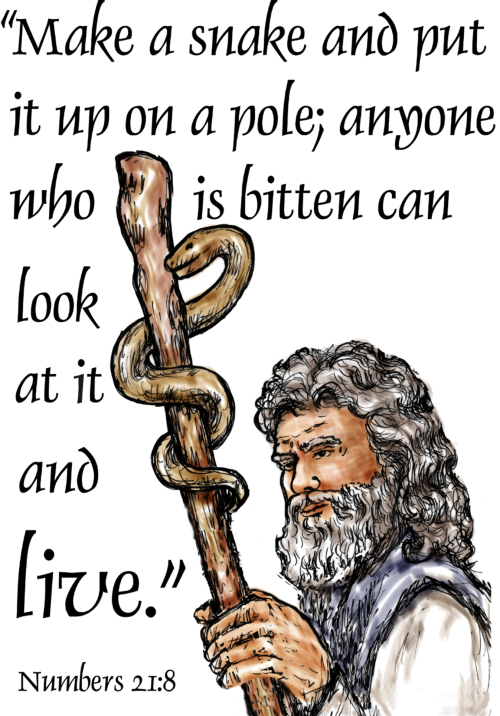
Unlikely Instruments of God’s Grace
Mar 10, 2024
Fourth Sunday in Lent
Text: Numbers 21:4-9
Pastor Jean M. Hansen
As our study of covenants, or promises, made between God and people in the Old Testament readings continues, we shake our heads at what I affectionately call the “snake on a pole” story. It’s a strange one, that’s for sure, so I decided to begin with another snake story that goes like this:
Three men lived on a ranch out west, the father, John, and his sons Jake and Joe. They never had any use for the church until one day Jake was bitten by a rattlesnake. The doctor was summoned, but the prognosis was not good. Jake might die! The younger son was then sent to bring the pastor. Upon arriving, the pastor was asked to offer a prayer for Jake. “O God”, the pastor prayed, “we give thanks that you have sent this snake to bite Jake, which has caused him to seek you. We ask, Lord that you would send another snake to bit Joe, and a really big one to bite the old man, so that they, too might seek you. We thank you for your providence and ask you to send us bigger and better rattlesnakes. Amen.” (1)
Well! Now, lest you think I told that just to get a laugh, I assure you that it does fit with the Old Testament lesson because, you see, Ancient Israel needed the snakes. To understand why, we should do a bit of context review.
I won’t go back to the beginning of the story of the Israelites being freed from slavery in Egypt and entering the wilderness, other than to say there was a lot of whining, complaining and failure to trust God along the way. In chapter 13 of the book of Numbers the Israelites arrived at the border of Cannan, the promised land God was giving them, and sent a spy team on a 40-day reconnaissance mission to see what the land and its cities were like and whether the people were strong or weak.
When the spies returned, they proclaimed that it was indeed a land flowing with milk and honey, a place of abundant food. Yet, all but Joshua and Caleb expressed lack of trust in God in their fear about invading this place where, “all the people we saw are of great size” and “we seemed like grasshoppers (compared) to them.”
No sooner was the report out of their mouths than the wailing began; “Would that we had died in the land of Egypt!” In fact, they wanted to replace Moses, and when Joshua and Caleb tried to calm them down saying, “the Lord is with us”, the Israelites threatened to stone them. So, God threatened to strike them with a pestilence and disinherit them. Once again, Moses intercedes on the people’s behalf and God promised not to wipe them out. The consequence of their rebellion, though, is years of wandering in the wilderness and that no one who is older than age 20 when this event occurred would enter the promised land … except Joshua and Caleb.
Time passed, there was more grumbling and challenges to Moses’ leadership, but as today’s story begins the end of the journey was near. Yet, when they took a detour, going the long way around, the people’s impatience was sparked. This time, though, when they complained it was not just against Moses, or to God, but against God.
Quoting commentator Stan Mast, they challenged the great redemptive act of God by which they were freed from slavery. He writes, “In no uncertain terms, Israel is rejecting the grace of God in all its forms – his great redemptive acts on their behalf and his daily provision for their lives. Anything and everything God had done for them in his gracious love is spurned by an impatient, unbelieving, ungrateful and rebellious people.” (2)
And, so, the snakes invade, poisonous snakes which bit the people and many of them died. What happened next is “the norm” for the Israelites; they came to Moses and repented saying, “We have sinned by speaking against the Lord and against you; pray to the Lord to take away the serpents from us.”
But, did you notice, the request was not granted. The snakes stayed, but God tells Moses to make a serpent of bronze, put it on a pole, so that everyone who was bitten could look at it – look up – and live.
OK…that’s strange…why? Well, like John, Jake and Joe in the story I began with, the people of Israel needed the snakes. God had repeatedly changed the situation, that is, reversed the divinely ordained punishment they deserved; but that was not working. The people needed to change. In a sense, they had to watch where they were walking and what they were saying, and if they took a wrong step, the consequence was immediately real as they suffered the pain of a snake bite. Then, to avoid death, they had to look up at that pole and be reminded from whom their help and healing would come. They had broken the covenant of trust with God; in this way that relationship could bit by bit (or bite by bite?) be restored and they would be changed.
Or, think of it this way, writes commentator Scott Hoezee, “the people had to look at an icon of the very thing that was afflicting them – which was simultaneously a vivid reminder of the sin that brought the scourge – before some kind of healing was going to happen.” (3) The snakes ended up being a vehicle of God’s grace.
And the cross, an instrument of torture and death, also is an instrument of God’s grace. Today’s much-loved quote from John 3:16 is prefaced with these words of Jesus, “Just as Moses lifted up the serpent in the wilderness, so must the Son of Man be lifted up, that whoever believes in him may not perish but have eternal life.” (John 3:14-15) Listen to this, “Just as a bronze snake-on-a-pole can suck the venom out of a snake bite, Christ-on-the-Cross can pull the sting out of even death itself. (4)
We too are on a journey toward a new covenant of grace, and the cross is the unexpected vehicle of that grace, so that we too must look up. AMEN
-
“Lectionary Tales for the Pulpit” by David E. Leininger, Series VI, Cycle B, Fourth Sunday in Lent – B
-
“Numbers 21:4-9 Commentary” by Stan Mast, March 14, 2021, www.cepreaching.org
-
“Numbers 21:4-9 Commentary” by Scott Hoezee, March 15, 2015, www.cepreaching.org
-
“Numbers 21:4-9 Commentary” by Meg Jenista, March 10, 2024, www.cepreaching.org






